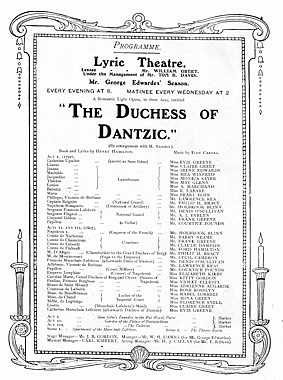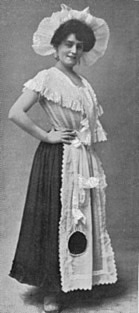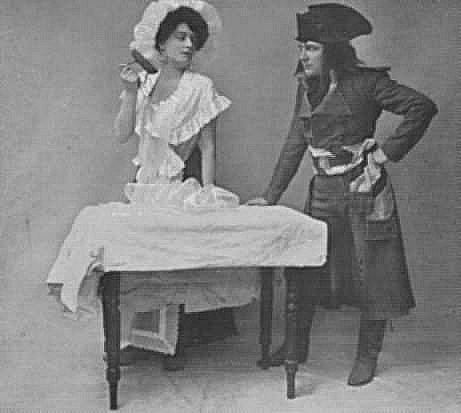
The Duchess of Dantzic
Book & and Lyrics by Henry Hamilton. Music
by Ivan Caryll
Based on the play "Madame Sans Gêne" by Victorien Sardou
Lyric Theatre, London - 17 October, 1903
Daly's Theatre, Broadway 16 January, 1905 (93 perfs)
Story
A storm in a teacup is proverbially one that may safely be ignored by the wise, but there is no proverb that deals with storms in a washtub. Throughout the story these storms rage, and it is always the washtub that is in evidence, whether our Sans Gêne be in the Rue Royale as Catherine Upscher, or in the Palace of Fontainebleau as the Duchess of Dantzic.
But then these were stormy, stirring times. In July, 1792, the King of Prussia and the Emperor of Austria were preparing for an invasion of France, relying on treason and internal dissension to open a passage for their troops to the capital. Louis XVI. was still nominally king ; but his bead, though adorned with a cap of liberty, was being clamoured for by a revolutionary mob. The king and emperor had threatened, Evie Greene as Catherine (known as Sans Gêne) in his bombastic manifesto, terrible and exemplary vengeance on Paris if the Tuileries -,were invaded or violated, or if any insult were offered to him or any member of the royal family. To this insolent challenge followed the revolt of the loth of August, and with the light-heartedness characteristic of the Parisian, a notice was stuck up on the ruins of the Bastille announcing that there would be "dancing nightly,"" among its ruins.
The fortunes of men are lost and made in times of great social upheaval. Fresh standards of merit are set up, and every man is the creature of the hour. What wonder then that hope of advance and ambitious visions of the future are the topic among all the citizens that flock the Rue Royale. Among these comes Lieutenant Bonaparte, haggard, restless, out of humour with the world, contemptuous of the things that please the noisy throng, moving around that jovial spirit, Sans Gêne. Her lover is away at the attack on the Tuileries, and she, to relieve her mind of anxieties on his behalf, betakes herself vigorously to her washtub. Bonaparte's advent, rough though it is, is something in the nature of a relief.
Besides, the lieutenant owes seventeen francs for washing, and although he may talk vaguely and as a visionary of the great things he will do and the important position he will hold, to a practical woman like Catherine Upscher talk like that doesn't pay bills. On the point, however, of demanding a settlement, she learns from him of his misfortunes, his poverty and his anxious support of an old mother. That settles the bill. Nay, more, the erstwhile stern creditor actually offers financial assistance. But Catherine, as a matter of principle keeps the bill.
Scarcely has Napoleon left when a young noble, pursued by the mob, seeks and obtains refuge at the laundry, and is hidden by the intrepid laundress in her bedroom. Not a moment too soon. The mob rushes in, and with them Lefebvre. Has Catherine seen the hated aristocrat?
 Catherine has not. Papillon, a merry pedlar,
who had assisted her in her humane efforts has also not seen him.
Can he have got into Catherine's room? Catherine is indignant at
the suggestion, but in order to convince the mob Lefebvre, her affianced
husband, enters the room, and on his reappearance declares it to
be empty. But when alone with Catherine he reproaches her bitterly
for hiding a lover, and matters between the two appear to be critical.
Catherine has not. Papillon, a merry pedlar,
who had assisted her in her humane efforts has also not seen him.
Can he have got into Catherine's room? Catherine is indignant at
the suggestion, but in order to convince the mob Lefebvre, her affianced
husband, enters the room, and on his reappearance declares it to
be empty. But when alone with Catherine he reproaches her bitterly
for hiding a lover, and matters between the two appear to be critical.
Overhearing the dispute, the refugee comes forward, and is able, with a few words, even at the risk of being captured, to clear the matter up between the lovers. And now, with Lefebvre as an ally, the Vicomte makes good his escape, leaving his infant son in the charge of Madame Sans Gêne.
Already promotion and advancement are in the air. Lefebvre obtains a commission, orders arrive for further operations, and Catherine obtains an appointment as vivandière to his regiment.
During the fifteen years that succeed events have followed one another rapidly and almost dramatically. The morbid lieutenant who owed seventeen francs for his washing is Emperor of France. The young soldiers who were his friends in those earlier days have become Marshals of the Grand Army. Dukes and generals from the Rue Royale surround the throne, and in their gorgeous habiliments betray little of their lowly origin.
With one exception - there is masquerade and pretension. Even Papillon, the good-natured pedlar, the jovial and gay wanderer of the old times, is now cramped in fashionable attire, and limited in his gaieties by fine courtesies and elaborate etiquette. But Sans Gêne, as Duchess of Dantzic, is Sans Gêne still. Alas for the peace of the Courts, too much Sans Gêne. Would it be credited that among all that aristocratic bourgeoisie the Duchess has the effrontery, to be genuinely in love with her "dear old man," her old lover Lefebvre, now Marshal of France? Nay more. There are other scandalous rumours about. The Duchess had been caught by Napoleon's magnificent sisters trying on a new cloak on the terrace at Fontainebleau, and taking lessons in deportment from a mere milliner - Papillon to wit ! A wrangle follows in which Catherine, having retained some of her old fluency, easily routs her opponents, but not before the Emperor has intervened.He is weary of this incessant cackle. His Court is disgraced by conflicts that might be tolerated among washerwomen in the Rue Royale, but cannot be permitted at his Court and round his person. Already he is thinking of his own divorce. To a man who has made his position by adventure, position is everything. A noble wife enhances, while a low-born one degrades it. That a Marshal of France should be mated to a vulgar shrew is an offence to this principle, and to the parvenu crowd that surrounds him. It seems, therefore, quite rational that the Emperor should order his high officers' affairs to the extent of decreeing a divorce where an unsuitable wife appears unable to take the position he has bestowed upon her husband.
Marshal Lefebvre, Duke of Dantzic, is peremptorily
commanded by Napoleon to discard his wife and marry a lady of the
Court, Renee de Saint Mézard. But advancement and well-earned
honours have not made the honest soldier less appreciative of his
good wife, and he indignantly refuses. The Emperor is inexorable,
and, to further distress the couple, a lamentable want of discretion
on the part of their adopted son - the child left with them by that
Vicornte de Béthune whom they rescued from the mob - places
their fate in the hands of the autocrat whose god is ambition. Adhèmar
de Béthune is in love and affianced to this same Mademoiselle
Renee whom Lefebvre is commanded to marry, and the young man, on
learning of his Emperor's infamous plans, insults him, breaks the
sword he wears as an officer in his army, and refuses to serve him
any longer. Arrest and a death sentence follow promptly. 
One condition of respite is allowed. The Vicomte shall live if the Duke and Duchess of Dantzic consent to a divorce and the Duke to the remarriage arranged for him. The death of the young man whom they love as a son is brutally laid at their door if they refuse.
The Court is jubilant. The Emperor's sisters cannot conceal their satisfaction. The Duchess is forbidden the Court, and opportunity of supplication is therefore impossible. But Catherine is Sans Gêne when circumstances requuire resourcefulness. She has treasured up a small scrap of paper at the head of which figures the name of a certain Lieutenant Bonaparte, and under that name certain details as to shirts and pants, and a grand total of seventeen francs, unpaid, for their washing.
Armed with this the distracted but still alert Catherine forces her way to the Emperor. The Court is indignant at this disobedience, and the Emperor orders her to be kept in confinement.
Picture 1: Evie Green as Catherine Picture 2: NAPOLEON - I don't know your name, I know your face. Where have I seen it before? CATHERINE - Probably when I brought you washing home. |
One moment alone with him gives her the opportunity she seeks. She produces the bill, demands her seventeen francs, and reminds the now bewildered Emperor that she was that Sans Gêne who took pity on his poverty, and who, when days were hard for her too, not only allowed him this extended credit, but offered to ease his embarrassed circumstances by a loan.
Napoleon Bonaparte has his past struggles
thus thrust forcibly upon him. Hard though he is he cannot resist
the friends of his old days, better and more genuine than those
with whom success has surrounded him. Madame Sans Gêne wins
her suit, and the Emperor himself blesses the union between Adhèmar
and Renee.
Rudolph Birnbaum
Musical Numbers:
Act 1
- Here you may gaze upon a bevy of beauty – Lisette, Jacqueline, Mathilde and Laundresses
- When the trumpets sound "To arms" – Soldiers
- Wine of France! – Sergeant Francoise Lefebvre and All
- Catherine Upscher, licensed laundress – Catherine Üpscher
- Are you wanting silk or satin? – Papillon and Chorus
- Fricassée (dance)
- My Sabots – Catherine
- Do You Remember? – Francoise and Catherine
- Dear Francois – Catherine Upscher, Sergeant Francoise Lefebvre, Papillon and Phillipe
- Forgive me, pray – Phillipe (New York production only)
- Finale Act I
11a. The tyrant is shaken – Soldiers, Mob, Laundresses and Chorus
11b. Aha, my boy, I give you joy – Captain Reignier
11c. Brothers in Arms – Catherine
11d. Then haste to the wedding – All
Act 2
- Old days have come again – Reignier, Pauline, Caroline Murat, Ladies and Courtiers
- When lurid terror ruled the land – Adhémar
- His Majesty orders that ladies at court – Ensemble
- You know the legend olden – Adhémar and Renée de Saint Mezard
- La Petit Caporal (Lyrics by Ross) – Renée and Chorus
- Here in big boxes we bear – Chorus
- I'm the Milliner Monarch of Paris – Papillon and Chorus
- First right, then left – Catherine and Papillon, with Chorus
- Vivat! Vivat! Imperator Salve – Entrance of Napoleon I
- La Midinette – Lisette and Chorus (New York production only)
- Finale Act II: Assent to no divorce I can – Catherine, Francois, Napoleon I, Adhemar and Courtiers
Act 3
- Mirror, in thy glass we scan – Catherine
- A real good cry together – Catherine, Renée and Babette
- Though many a happy year hath flown – Catherine and Lefebvre
- Once the lips the Bourbon owned – Ladies and Courtiers
- Menuet
- The Legend Olden – Catherine and Napoleon I
- Finale Act III: Gavotte de Vestris – All